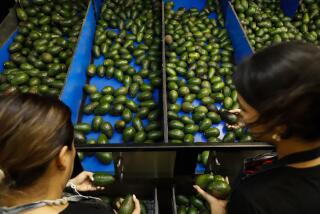U.S. Raises Questions on Some Meat Imports
WASHINGTON — An internal audit of the Agriculture Department’s methods of inspecting imported meat said Thursday that enforcement and overseas compliance with U.S. standards in some ways fall short of protecting American consumers from adulterated foreign products.
Investigators found the imported meat inspection process to be “generally satisfactory.” However, some potentially serious shortcomings were identified, including sloppy paperwork at U.S. ports and a lack of security and attention to detail in some foreign meat plants.
More than 2.5 billion pounds of meat are imported annually. Some of this is hamburger-quality beef from Australia and New Zealand.
Investigators reviewed operations at the department’s Food Safety and Inspection Service in Washington and at the agency’s field offices. Visits were also made to government regulatory bodies, laboratories and slaughterhouses in Australia and New Zealand.
During their foreign visits, investigators discovered that:
- Animal drugs not approved for use in the United States were routinely used in Australia and New Zealand.
- Monitoring of herds suspected of having drug residue contamination was insufficient to prohibit the entry of animals from the herds into export markets.
- Plans for sampling chemical residues in meat could not ensure that samples taken were a valid representation of the foreign residue problems.
- Safeguards over health certificates “were not sufficient to preclude the use of unauthorized certificates” to circumvent inspection procedures.
During the audit, Food Safety and Inspection Service management “began comprehensive corrective action, which we believe, if completed, will resolve these deficiencies,” the report said.
By law, the service is required to ensure that the wholesomeness of imported meat products is equivalent to U.S. standards.
In Australia, the inspection sampling plan for the entire year was prepared and distributed to inspectors at the beginning of the year.
More to Read
Sign up for Essential California
The most important California stories and recommendations in your inbox every morning.
You may occasionally receive promotional content from the Los Angeles Times.










